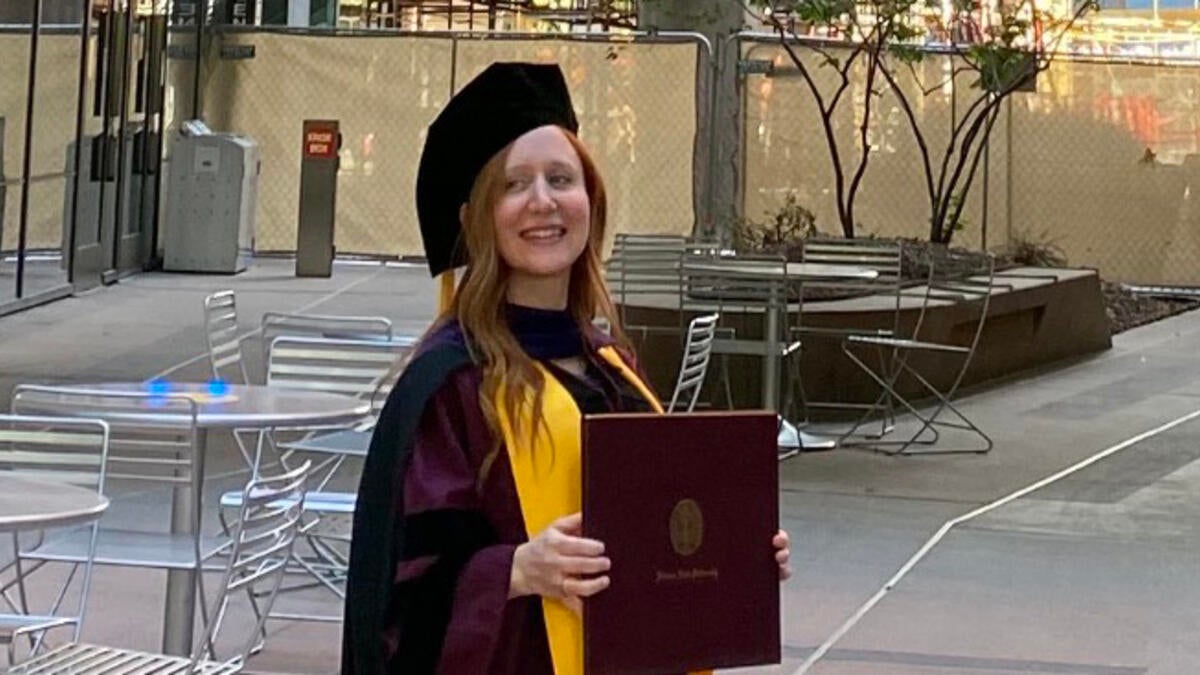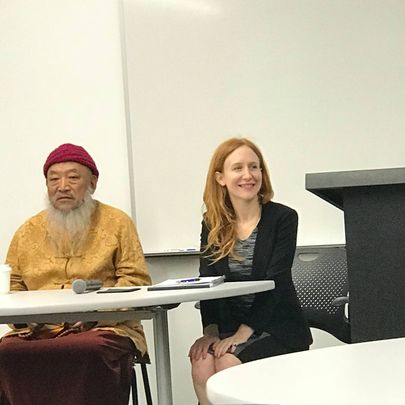JD grad applies Tibetan practices to navigate law school

Vanessa Kubota, a former translator and interpreter for the Tibetan language, looks forward to taking her ASU Law JD to make a difference in the public sector.
Editor's note: This story is part of a series of profiles of notable spring 2021 graduates.
A translator and interpreter for the Tibetan language. A Fulbright Scholar. A reader of Sanskrit and Hindi who took Mandarin while an undergraduate and spent summers living in monasteries in India and Nepal with Tibetan monks and nuns.
All accomplished before Vanessa A. Kubota even applied to the Sandra Day O’Connor College of Law at Arizona State University. And for Kubota, who will earn her JD this spring, her many more achievements since know no bounds. She credits ASU Law’s exceptional legal training in an environment that feels like family.
“What drew me to ASU was the fact that it is a top law school with the highest-caliber legal education and excellent job-finding statistics for its graduates, and yet people are very approachable and down-to-earth,” said Kubota, who has served as a teacher’s assistant for property law and constitutional law and worked as a research assistant to two law professors while pursuing her JD.
“ASU Law is a school that truly cares about students’ success on every level – not just our academic success, but our whole being and our physical and mental health,” Kubota said. “The ASU community is very supportive, and the faculty is phenomenal. The law school is beautiful, inside and out.”
An O’Connor Merit Scholarship recipient and Pedrick Scholar, Kubota says ASU Law made her immediately feel welcomed and supported as a mother of two small children, with her daughters often joining her in the study rooms and during moot court team rehearsals.
“The students here are intelligent and ASU has really made it a point to foster and nurture diversity,” she said. “People here are kind and they treat one another with respect. It’s the kind of place where students will cheer for one another’s accomplishments and will support one another during the challenging times.
“It’s a law school filled with brilliant and genuine people, good people, people who love the law and who want to do good in the world. I feel blessed to graduate from such a stellar institution.”
Question: What was your “aha” moment when you realized you wanted to study in your particular field of law?
Answer: I have known since I started law school that I wanted to work in the public sector. Much of my externships have been with the federal government in some capacity or another.
Justice William Montgomery’s class on the role of victims in criminal procedure really opened my eyes to the importance of victims’ rights and the need for prosecutors who respect and understand the constitutional rights of victims. I am especially interested in prosecuting violent crimes, crimes against children, domestic violence, hate crimes and human trafficking.
Interning in the violent crimes unit at the U.S. attorney’s office here in Arizona, and the O.C. district attorney’s office in California solidified my desire to become a prosecutor. Externing at the EEOC (Equal Employment Opportunity Commission) has made me want to work in employment discrimination law. I also loved my time at USCIS (United States Citizenship and Immigration Service) and all my externships. I am blessed to have found many lifelong mentors in the judges, lawyers and law professors I have worked with over these three years at ASU Law.
Q: What’s something you learned while at ASU Law — in the classroom or otherwise — that surprised you or changed your perspective?
A: When I started law school, it was very intimidating. I prayed a lot. There were many times where I thought I couldn’t do it. In law school, you are rewiring your brain — forging new synapses, as Professor Bob Miller used to say in our civil procedure class. You are basically going in with these preexisting habits and somewhat lazy or untrained ways of thinking, and law school begins to refine your mind. You become a sharper and more efficient thinker, and at the same time, because the learning process is so radically different from any other kind of education you may have experienced, you are feeling incredibly vulnerable and insecure as your entire sense of identity and your beliefs about your own intelligence are put to the test, challenged and transformed.
During the deconstruction process, the law school experience can feel very plutonic. You have to trust the process. It changes the very core of your being. You don’t realize it at first, but by the second year, you begin to notice that your mind is changing, evolving. Everything about you is being refined. Even the way you speak and interact. You become less frenetic, less impulsive and more grounded.
But there are still many moments of groundlessness. I learned that often our greatness emerges from these moments of pure vulnerability, where we are stripped of ego and forced to take an unmediated look at our own self-created barriers to learning. When things feel impossible, that is when we must keep going.
I remember Eleanor Roosevelt’s famous words, “You must do the thing you think you cannot do.” Five years ago, I never imagined that in 2021 I would be graduating from a top-tier law school with lifelong friends, colleagues and mentors. It still feels like a dream.
Q: What’s the best piece of advice you’d give to those contemplating ASU Law, and those still in law school?
A: For those contemplating ASU Law, my advice is to enroll here. It is an amazing law school with a robust network of lawyers and judges who will help you every step of the way.
For those still in law school, my best advice is to have faith. Prayer has gotten me through many times when I felt scared or discouraged. Law school can be a spiritual experience. The training, the slow but ruthless annihilation of the ego, the experience of being humbled, the growth, the discipline, the wisdom, the feeling of camaraderie with your fellow classmates who are all going through the same thing – it’s truly the only kind of secular education I can think of that resembles the rigorous training of a martial artist or a Zen master.
My other piece of advice to law students is to surrender to the experience. Know that you are exactly where you are meant to be. Try not to get caught up in the trappings of comparison, even though it can be hard. Names, rank and status are somewhat illusory. They are helpful, but they do not define you as a law student. What defines you is your motivation. So be authentic with everyone. Do not try to be the smartest person in the room, but strive to be the kindest person.
The important thing is to find an area of law that ignites your love for being alive and makes you want to work hard. Find your reason.
Q: What are your plans after graduation?
A: After graduating I will be clerking for two years for the Honorable David D. Weinzweig at the Arizona Court of Appeals. Following that, I think I would like to apply for the Department of Justice Honors program. But I am open to see where my path takes me.
In addition to the O’Connor Merit and Pedrick scholarships, Kubota is a recipient of the Matt & Michele Feeney Family Scholarship, the Les Schiefelbein Global Dispute Resolution Scholarship, and the Matheson Client Counseling Scholarship funded by Davis Miles McGuire Gardner. She completed more than 600 hours of pro bono work and multiple externships and internships while at ASU Law. She also was recognized with multiple awards including the CALI Excellence for the Future Awards for achieving the highest grade in legal method and writing, victims in criminal procedure, and race and intellectual property.
ASU Law JD grad Vanessa Kubota (right) says one of her most memorable experiences was bringing renowned Tibetan lamas to the law school two years in a row to lecture on mediation and alternative dispute resolution from a Tibetan perspective. Kubota interpreted for the lamas when they visited.
More Law, journalism and politics

Native Vote works to ensure the right to vote for Arizona's Native Americans
The Navajo Nation is in a remote area of northeastern Arizona, far away from the hustle of urban life. The 27,400-acre…

New report documents Latinos’ critical roles in AI
According to a new report that traces the important role Latinos are playing in the growth of artificial intelligence technology…

ASU's Carnegie-Knight News21 project examines the state of American democracy
In the latest project of Carnegie-Knight News21, a national reporting initiative and fellowship headquartered at Arizona State…
